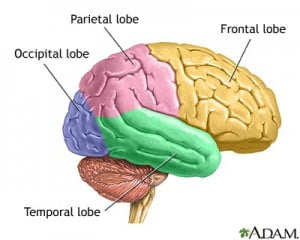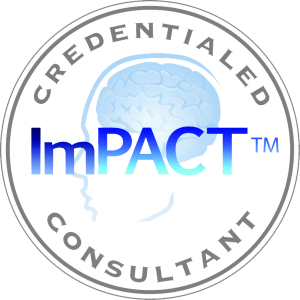 Traumatic Brain Injuries (TBI) occur for a variety of reasons, from sports-related injuries (e.g., concussions) to car accidents. The impact that the TBI can have on cognitive, emotional and behavioral functioning depends on the location and extent of the damage. Location helps determine what functions are going to be impacted. For example, damage to the left side of the brain may involve deficits in speech production and motor control of the right side of the body. The extent of the damage determines how severe the loss of functioning is, recovery time and whether the deficits that result are limited to a few domains of functioning or are more extensive. With more severe injuries, including those where loss of consciousness lasted for more than a very brief period of time, the cognitive deficits are likley to be more serious.
Traumatic Brain Injuries (TBI) occur for a variety of reasons, from sports-related injuries (e.g., concussions) to car accidents. The impact that the TBI can have on cognitive, emotional and behavioral functioning depends on the location and extent of the damage. Location helps determine what functions are going to be impacted. For example, damage to the left side of the brain may involve deficits in speech production and motor control of the right side of the body. The extent of the damage determines how severe the loss of functioning is, recovery time and whether the deficits that result are limited to a few domains of functioning or are more extensive. With more severe injuries, including those where loss of consciousness lasted for more than a very brief period of time, the cognitive deficits are likley to be more serious.
With mild brain injuries, such as concussion sustained during athletic competition, more subtle deficits will impact functioning. These subtle deficits are more difficult to pick up simply by talking to the person. The symptoms reported may include fatigue, irritability, headaches, personality change, and attention and memory problems. The goal of the neuropsychological evaluation when dealing with TBI is to elucidate the changes that have occurred in functioning, the services from the school and treatment team that may be necessary to improve daily functioning and to monitor progress and modify the services as needed.
For sports-related injuries, return to play is an important component of the evaluation. This often involves multiple administration of cognitive and emotional measures to determine if the athlete’s functioning has returned to baseline. Dr. Rozenblatt is a Credentialed ImPACT Consultant, using the ImPACT test in order to help determine how an athlete is functioning and whether he or she can safely return to play (along with the opinion of medical personnel and the athletic trainer and coaching staff). For more information click on the logo below:
 There are many ways to reduce the chances that you or your family members will have a concussion or more serious brain injury:
There are many ways to reduce the chances that you or your family members will have a concussion or more serious brain injury:
- Wear a seat belt every time you drive or ride in a motor vehicle.
- Buckle your child in the car using a child safety seat, booster seat, or seat belt (according to the child’s height, weight, and age).
- Children should start using a booster seat when they outgrow their child safety seats (usually when they weigh about 40 pounds).They should continue to ride in a booster seat until the lap/shoulder belts in the car fit properly, typically when they are approximately 4’9″ tall.
- Never drive while under the influence of alcohol or drugs.
- Wear a helmet and make sure your children wear helmets that are fitted and maintained properly when:
- Riding a bike, motorcycle, snowmobile, scooter, or all-terrain vehicle.
- Playing a contact sport, such as football, ice hockey, lacrosse, or boxing.
- Using in-line skates or riding a skateboard.
- Batting and running bases in baseball or softball.
- Riding a horse; or
- Skiing, sledding, or snowboarding.
Ensure that during athletic games and practices, you and/or your children:
- Use the right protective equipment (should be fitted and maintained properly in order to provide the expected protection);
- Follow the safety rules and the rules of the sport;
- Practice good sportsmanship; and
- Do not return to play with a known or suspected concussion until you have been evaluated and given permission by an appropriate health care professional.
For more information, contact Dr. Rozenblatt at (866) 840-9790 or neurodoc@advancedpsy.com.